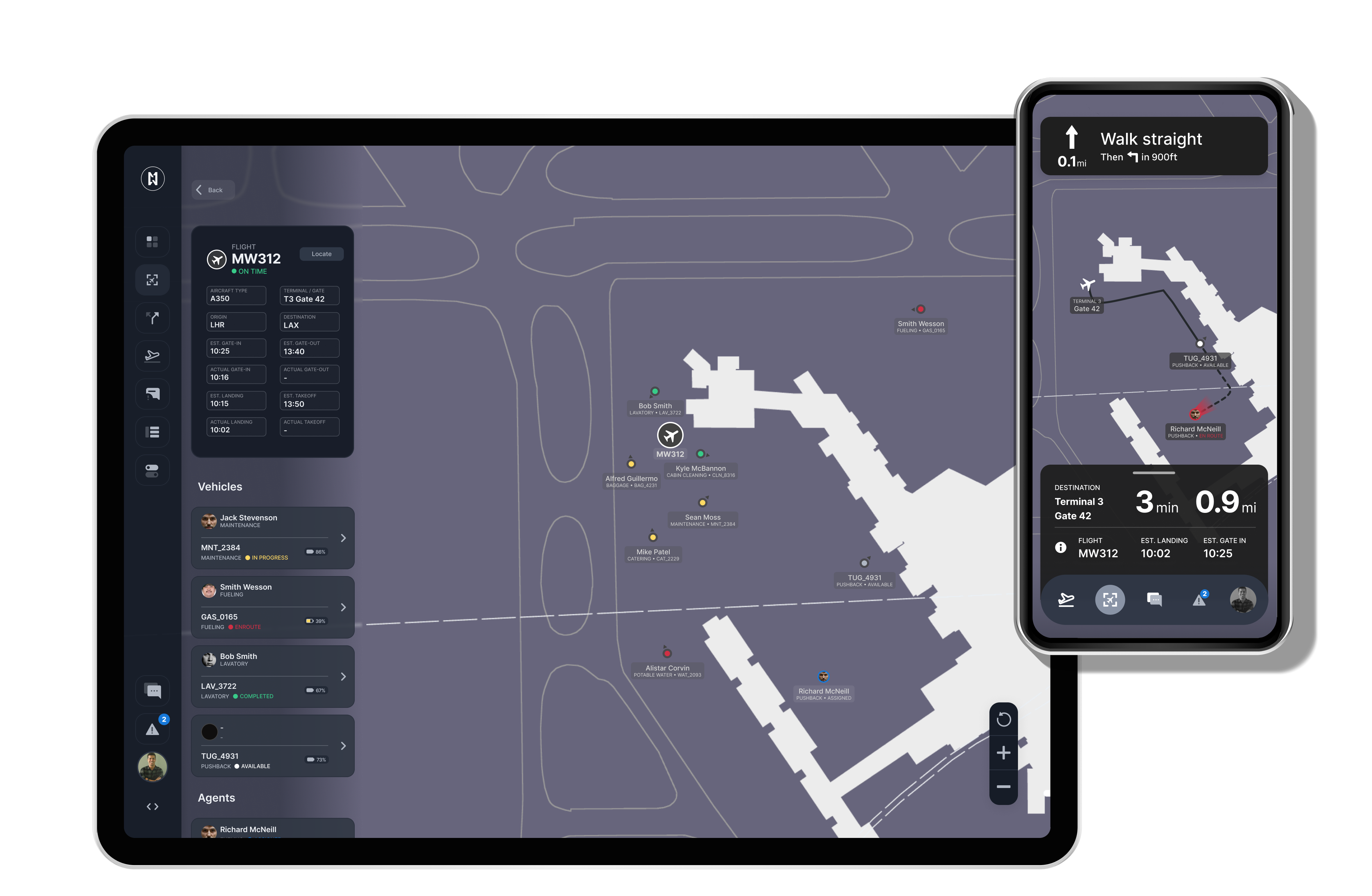The fact that any flight departs on time is a minor miracle, one that requires the precise synchronization of thousands of data points and an equally large workforce on the ground. Much of this the passenger never sees – especially the ground support crews and infrastructure that load catering and baggage, refuel planes, and assist in taxiing.
According to the founders of Los Angeles-based Moonware, this current status quo is begging for improvement.
Regarding ground operations, “everything is still really manual and really uncoordinated,” Moonware co-founder and CEO Javier Vidal said in a recent interview. “Everything still works with walkie talkies and papers. […] At the end of the day, it’s all a last-minute scramble to find the right people and the right equipment to service the flights on time.”
Moonware’s solution is an AI-powered OS for ground ops it calls HALO, which algorithmically coordinates ground operations in real-time. The software considers variables like distance, departure and arrival times, and crew availability before automatically dispatching crew and equipment. The startup’s cofounders, Vidal and Saunon Malekshahi, say it will reduce delays, airfield congestion and plane turnaround time.
The HALO software mines three main data streams: real-time flight information; crew schedules and task allocation; and ground positions and movement of the crew and the vehicles. This final data stream is proprietary to Moonware, and leverages work cell phones and low-cost GPS trackers to collate precise locations of all the “pieces” of the airfield workflow.
It’s a solution that Malekshahi likened to an AI-enabled “ground traffic control platform,” similar to how air traffic control (ATC) directs aircraft on the ground and in airspace today. Like ATC, the HALO software is airfield agnostic; in addition to commercial airlines, it can be used by cargo carriers, defense, and eventually even eVTOL operators.
Moonware’s solution has caught investor attention. The startup recently closed $2.5 million in pre-seed financing led by early-stage VC firm Third Prime, with participation from Zero Infinity Partners, The House Fund, Lorimer Ventures, Plug and Play, and several angel investors.

Image credit: Moonware
The three-year old startup’s vision for the future of airfields is not just limited to software. Instead, Moonware has much larger ambitions to weave autonomy into every aspect of ground operations, from the vehicles that transport baggage, to the pushback tractors that push the aircraft from the gate to the head of the runway.
The autonomy piece is further down the road, however. First, Moonware plans to launch the OS with commercial airlines, starting with airlines that insource their ground operations team: think the Delta Airlines hub at the Atlanta airport or United at SFO. Fortunately, while airlines are tightly regulated by the U.S. Federal Aviation Administration, the areas where ground operations take place are under no such similar authority – that means Moonware can launch, and hopefully scale, quickly.
The company’s first paid initial deployment will be with an undislosed “major carrier based out of Europe,” Vidal said. That deployment, which will take place in North America later this fall, will see HALO used to service around ten flights a day, scaled up to 15-20 flights per day over the course of 4-6 months.
Moonware is hoping to expand vertically across the airlines’ hub airports, with the expectation that HALO will have a network effect as more hubs use it. The time savings would compound, Vidal said: “We can save five minutes in one airport, and three minutes in another, and two minutes in another – all of a sudden, those minutes compound into hours’ worth of openings in their schedule. That’s where they can really add in more flights every day without having to purchase new aircraft, so no extra capex.”
The company is also in conversation with the U.S. Air Force, which also struggles with ground ops coordination. In fact, Vidal said their problems are arguably worse than those facing commercial aviation: “In their control towers, they essentially have whiteboards with magnets,” he said. “Whenever an aircraft or something moves on the air side, they move a magnet across a whiteboard.”
If all goes to plan, Moonware wants to introduce autonomy to ground ops likely later in the decade. Its a capability that will be especially useful as new forms of transportation, like eVTOL and even commercial hypersonic air, become operational. Malekshahi pointed to United Airlines’ massive $1 billion order with eVTOL developer Archer Aviation as a strong signal that electric aircraft will likely be integrated into commercial airports today.
As airports support more forms of air travel, walkie talkies and paper schedules will no longer cut it, Vidal added.
“We really see airports becoming hubs uniting all of these different modes of air travel,” he said. “The needs to service these aircraft are going to vary completely. Essentially what HALO is creating is that ecosystem to manage all the different servicing needs for all these different aircraft, ensuring compatibility and making that streamlined.”